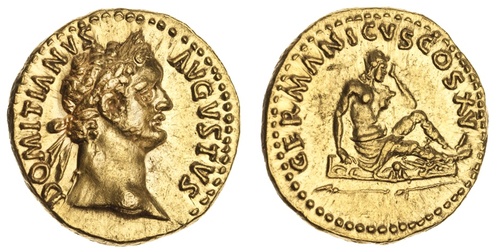
Auction: 23004 - Ancient and British Coins - Featuring the 'White Rose' Collection
Lot: 642
Roman Empire, Domitian (81-96), 'Triumph over the Chatti', Commemorative AV Aureus, struck AD 90-91, Rome,
Provenance
Spink, by private treaty, 13 April 1942 [ref. G9776] - £17.0.0 [with this ticket and collector's hand: MG/-/-]
R Moreland, collection purchased en bloc by Spink, July 1941 - £10.0.0
A soldier-emperor who lay in the shadow of his father and brother, Domitian's military triumphs were relatively scant, though his record was largely successful. One over-blown victory against the Chatti in AD 83 was utilised to mint this celebratory issue, the likes of which were minted again throughout the rest of his reign. This particular coin struck under his fifteenth consulship is particularly poignant given its striking in the aftermath of the Revolt of Governor of Upper Germania L Antoninus Saturninus in January 89. Saturninus expected his Germanic allies to cross the Rhine to support his Legions at Mogontiacum [Mainz], but they were prevented by a sudden thaw of the river and ice drift, and thus the revolt was quickly put down by L. Appius Maximus Norbanus and the future Emperor Trajan. Afterwards, Norbanus burned Saturninus' letters in an attempt to avoid implicating others. However, Domitian had numerous others executed with Saturninus, displaying their heads on the rostra at Rome. The Legio XXI was sent to Pannonia, and Domitian passed a law prohibiting two legions from sharing the same camp.
It is perhaps not that remarkable that the Aureus does not directly celebrate the repression of Saturninus' revolt but the wider and pre-existing triumph over the Germans. In the matter of military glory, Domitian's jealousy was acute: his brother had led the siege of Jerusalem, and his father had led most of the war in Judaea, and had won much glory in his earlier years, including the 'ornamenta triumphalia' for his command in Claudius' invasion of Britain [see lot 638]. Suetonius tells us that when his father established his government in Rome, Domitian wanted glory so badly that he "planned a quite unnecessary expedition into Gaul and Germany, from which his fathers friends managed to dissuade him". In actuality, his skills in the art of war were enviable: he is said to have been able to shoot an arrow between the spread fingers of a hand without fail.
Domitian's successful campaign against the Chatti extended the Roman border beyond the Rhine. In honour of this victory Domitian was hailed Germanicus. Suetonius deemed the campaign 'unjustified' and Tacitus was equally apathetic in his 'Agricola'. Though perhaps somewhat biased as Tacitus was writing about the life of his father-in-law, when discussing his successes in Britain he mentions that "Domitian heard, as was his wont, with joy in his face but anxiety in his heart. He felt conscious that all men laughed at his late mock triumph over Germany, for which there had been purchased from traders people whose dress and hair might be made to resemble those of captives, whereas now a real and splendid victory, with the destruction of thousands of the enemy, was being celebrated with just applause." These writers saw the campaign and the proceeding celebrations as extravagant beyond reason. To them it seemed a construction to overshadow the glory granted to Vespasian and Titus, considering the very small territorial gain the campaign resulted in and the fact that neither Vespasian nor Titus took the title 'Iudaicus' following their victories in Judea (Jones, The Emperor Domitian, pp. 129)..
Yet despite being wrapped up in a programme of self-aggrandizement the campaign was in itself significant and had a lasting historical impact, not so much for the territory gained, than for the measures taken to secure this territory in the future. With his victory over the Chatti, Domitian laid the foundations for a new system of securing the Roman frontiers in Germany, which resulted in the Limes: a series of watch towers, signal stations and a network of roads with which the borders of the empire could be rapidly reinforced and defended. Intriguingly the Legio X Gemina that crushed Saturninus' revolt had been formed under Julius Caesar for his 'Bello Gallica' (58-51 BC), and would be reformed under his appointed successur Octavian (see lot 636) at the Battle of Philippi against Brutus in 42 BC. For this faithful service, along with Legiones I Minervia, VI Victrix, and XXII Primigenia; all received the 'battle honour' title Pia Fidelis Domitiana - "faithful and loyal to Domitian". Such a title was erased when Domitian's rule ended as part of his subsequent damnatio memoriae.
Subject to 20% VAT on Buyer’s Premium. For more information please view Terms and Conditions for Buyers.
Sold for
£32,000
Starting price
£10000




